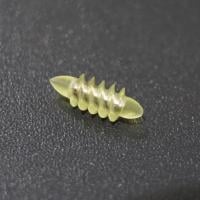Bionaut Labs’ fantastic voyage continues, with $43.2 million in new venture capital funding to help build up its tiny robots into machines capable of swimming through the human body and delivering drugs where some therapies and surgeons can’t reach.
The remote-controlled, micro-scale devices are designed to be guided through blood vessels and tissues by an external magnetic field. Once they reach their destination such as a deep and difficult brain tumor they can release a range of different therapeutic payloads—including injectable drugs and chemotherapies previously rebuffed by the blood-brain barrier.
The company’s series B round was led by Khosla Ventures, which was joined by new backers Deep Insight, OurCrowd, PSPRS, Sixty Degree Capital, Dolby Family Ventures, GISEV Family Ventures, What if Ventures, Tintah Grace and Gaingels. Returning investors included Upfront Ventures, BOLD Capital Partners, Revolution VC and Compound.

The Los Angeles-based Bionaut Labs made its debut in March 2021—raising $20 million in a financing round that was also led by Khosla Ventures—after four years of working on its screw-shaped microrobots in stealth mode.
The company was launched by two robotics engineers, CEO Michael Shpigelmacher and Executive Chairman Aviad Maizels, who previously co-founded the facial recognition company PrimeSense, which was bought by Apple in 2013 for about $400 million and incorporated into the iPhone’s FaceID unlocking.
Bionaut Labs’ to-do list includes researching its devices’ potential in treating central nervous system conditions such as Parkinson’s disease, Huntington's disease and hydrocephalus. The company has also worked with Candel Therapeutics to examine the Bionaut’s use in delivering cancer-killing viruses.
The latest funds are slated for the clinical development of the company’s lead programs including treatments for malignant glioma brain tumors and Dandy-Walker syndrome, a rare neurological disorder found in children. Bionaut Labs said it aims to begin human trials in 2024.